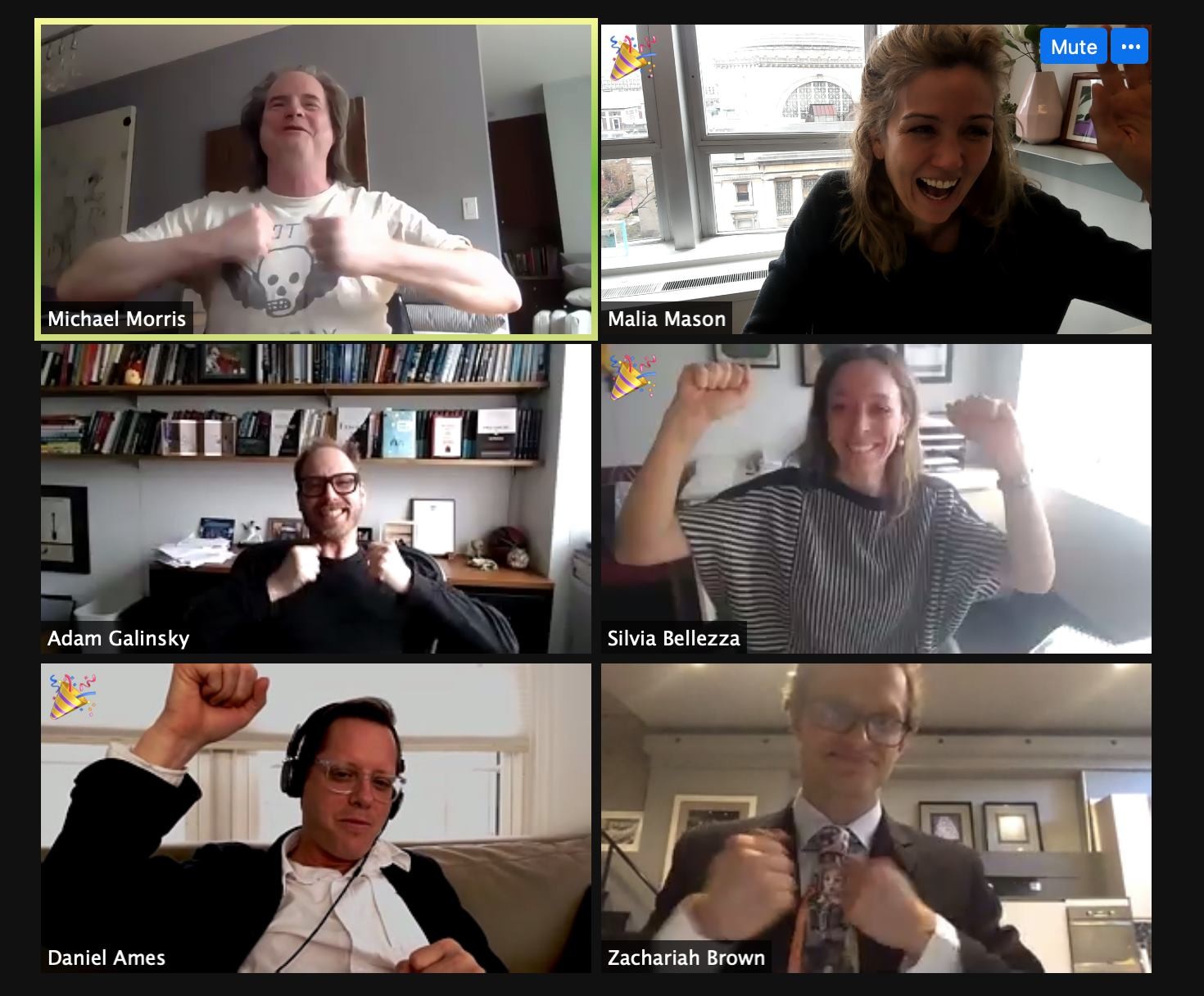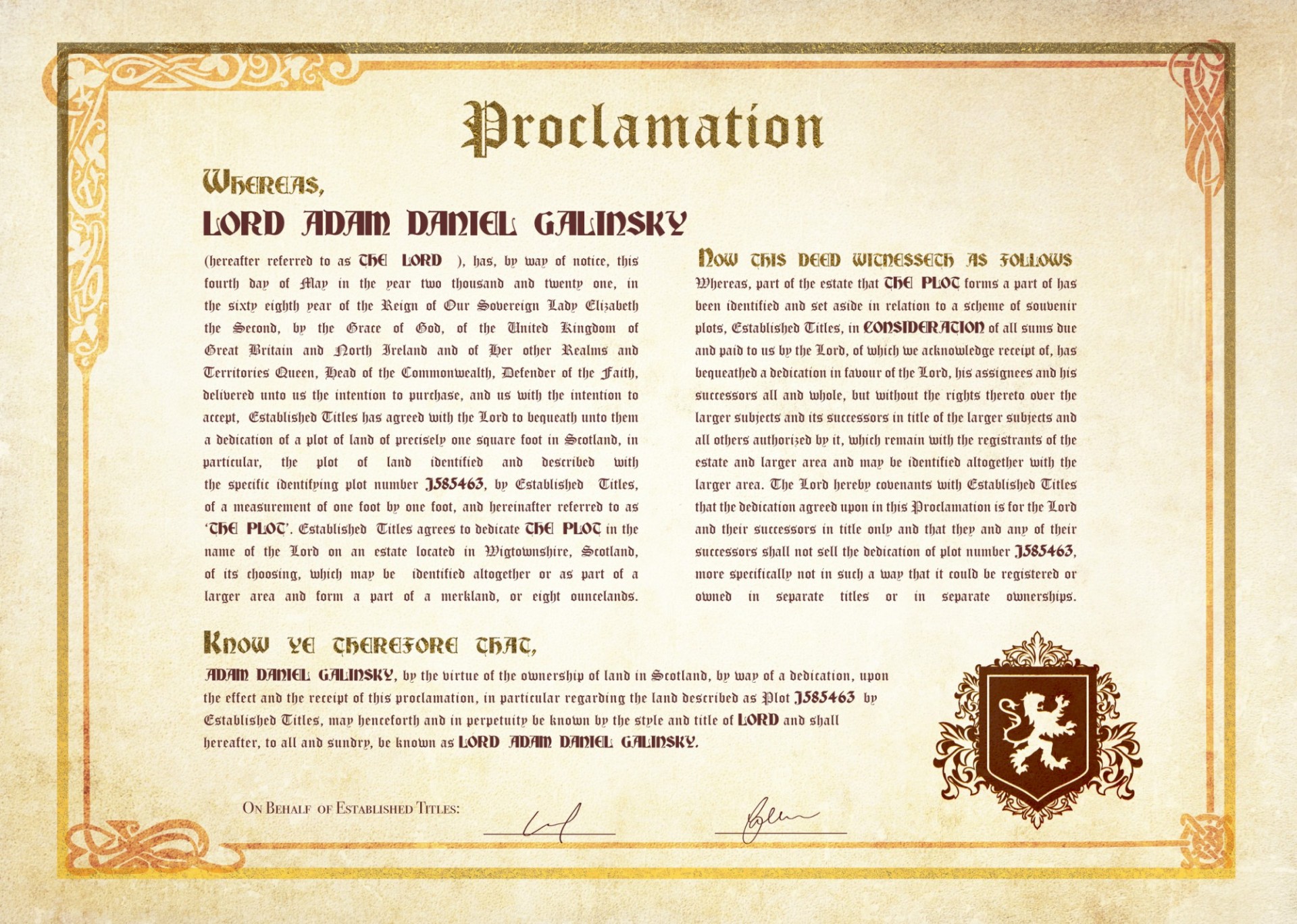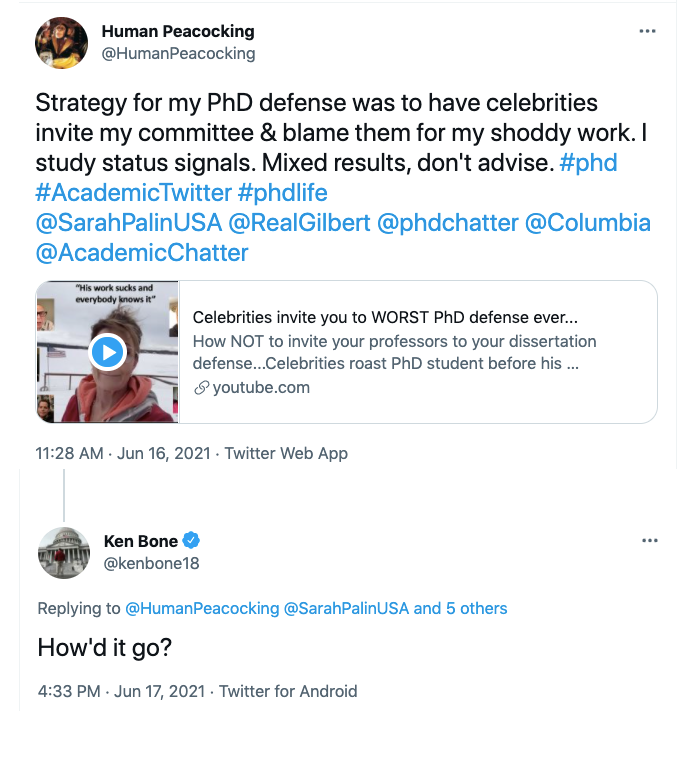What Do Sarah Palin, Jerry Springer, and Gilbert Gottfried Have to Say About This Grad Student's Dissertation?
Zachariah Brown (BUS’13, ’21) used Cameo to invite his professors to his doctoral research presentation on, you guessed it, "peacocking."

The dissertation defense: a two-hour oral evaluation and revered hurdle to finishing one’s doctoral degree, overseen by a committee of accomplished scholars and advisors. A singular event, a decade in the making.
As is customary, PhD candidate Zachariah Brown invited his committee of professors. But his invitations were… atypical.
“This will be a slow-motion train-wreck,” warns former Trump White House Communications Director Anthony Scaramucci in one video clip.
“Zach apologizes in advance for shoddy research,” adds former governor of Alaska Sarah Palin in another.
Using the personalized video app Cameo, Brown, who graduated from Columbia Business School in 2021, hired B-list celebrities to deliver a variety of invitations to his defense. In addition to Palin and Scaramucci, other invites featured TV personality Jerry Springer, undecided-voter-turned-meme Ken Bone, actor Gilbert Gottfried and comedian Chris Turner.
Brown sent a series of these invites, escalating in tone and in the degree of status signaling. Part of his goal was to transgress that invisible line of going too far, to the degree where, according to his research, you then may be subject to negative social consequences. The final chapter of his dissertation focuses on this phenomenon, and the subsequent social punishment.
"I wanted the invites to embody the topics we'd be discussing," he said.

Did his defense suffer, in the end? Professor Silvia Bellezza, Gantcher Associate Professor of Business Marketing and a member of Zach’s committee said the stunt didn't impact the evaluation of the work.
“It reinforced my impression of Zach as a fun person, but I’d like to think that it did not interfere with the judgment on the defense.
Brown agreed (he did receive his degree, after all), and pointed out that because his defense committee is also very high-status, it was less likely that they would be threatened by his performance. “They kind of had a sense of what crap I was pulling.”
In addition to showing off by deploying B-list celebrities, Brown also bought landed titles (My Lord, My Lady) on the internet for each of the members of his dissertation committee. “They bestowed a fancy title on me, so out of gratitude, I wanted to bestow a fancy title on them.”
Despite these shenanigans, Brown passed his defense without incident. The videos weren’t discussed.

A Student of Showing Off
Having lived much of his adult life overseas in Europe and Asia, working in business and finance, Brown came to Columbia Business School to pursue an MBA in 2011. After completing his degree, Brown was working in Hong Kong with ultra high net-worth individuals, which fanned this flame of interest in status.
Brown returned to Columbia in 2015 to continue to explore “peacocking”— how humans are obsessed with status and hierarchy and the subtle ways in which posturing impacts social status. To better understand the origins of the status-obsessed species, Brown also worked in primatology field schools in Kenya, sitting in on classes on primate behavior.
In the animal kingdom, the ultimate motivation is to mate and pass on your genes, which makes “peacocking” more straightforward. As social primates, humans do care about sex, but also have additional motivations, status and hierarchy chief among them.
Where some might find studying the prevalence of posturing in business disheartening, Brown delights in it.
“There’s a stigma to showing off,” Brown says. “But it’s kind of fascinating and beautiful, just like actual peacock feathers. There’s equally as many ways of showing off as there are beautiful feathers of different birds out there, and we appreciate the birds, but we don’t appreciate the people, which I think is a shame.”
Question: Who Is Guilty of Peacocking? Answer: Everyone
Everyone shows off, Brown said, including him. “Research is me-search,” he adds. “I also show off.”
And everyone glories in examples of other social groups or professions showing off. But most people seem to feel awkward or defensive when the status signal lens is turned back around on them and they’re accused of showing off.
“Academics love when I give examples of rich and famous people showing off for other rich and famous people. That’s a peacock feather they like to laugh at,” said Brown. “But academics show off just as much: if you’re in Saint-Tropez going down the promenade and looking at people showing off their boats, it’s not that different from academics showing off their complex knowledge with crowds of PhD students surrounding them.”
Much of Brown’s recent research focuses on the use of jargon, or the performative use of language to demonstrate expertise.
In an article in Harvard Business Review, Brown and co-authors Professors Eric M. Anicich, and Adam D. Galinsky write that the use of jargon can be motivated by insecurity about status.
"There’s equally as many ways of showing off as there are beautiful feathers of different birds out there, and we appreciate the birds but we don’t appreciate the people, which I think is a shame."
Academia is also rife with jargon. Brown and his co-authors collected 64,000 dissertations and assessed the amount of jargon used in their titles. The lower the status of the school where the author studied, the more they used jargon. Similarly, higher-status academic journals have been found to be associated with more complex language.
Despite the fact that most dislike its use, jargon prevails in most professional fields. It speaks to the human insistence on signaling our place in hierarchy and social environments, even in spaces you wouldn't expect.
In the future, Brown hopes to do new research out in the field—at the avowedly non-hierarchal community-focused event Burning Man. Brown said it is another example of a space where, against the stated aim of the environment, "peacocking" is just too good to give up.
